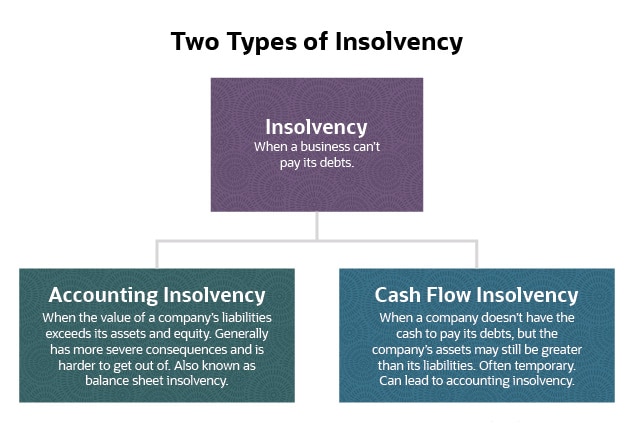What Does Insolvency Practitioner Mean?
What Does Insolvency Practitioner Mean?
Blog Article
What Does Insolvency Practitioner Mean?
Table of ContentsAn Unbiased View of Insolvency PractitionerAn Unbiased View of Insolvency PractitionerThe Best Guide To Insolvency PractitionerThe 4-Minute Rule for Insolvency PractitionerExcitement About Insolvency PractitionerThe 20-Second Trick For Insolvency PractitionerInsolvency Practitioner Fundamentals Explained
Insolvency is when obligations are more than the value of the firm, or when a debtor can not pay the debts they owe. A business can end up being bankrupt due to a number of scenarios that result in inadequate cash money flow. When confronted with bankruptcy, a service or individual can speak to creditors directly and restructure financial debts to pay them off.
Insolvency can lead to bankruptcy procedures, in which lawsuit will certainly be taken versus the financially troubled person or entity, and assets. Insolvency Practitioner might be sold off to pay off exceptional debts. Local business owner might call lenders directly and restructure financial obligations into more convenient installations. Lenders are usually amenable to this strategy because they wish to be settled and avoid losses, also if the payment is on a delayed routine.
The owner produces a proposition outlining just how the financial obligation might be restructured utilizing cost decreases or various other prepare for support. The proposition shows creditors just how the service may generate enough capital for lucrative operations while paying its financial debts. Commonly, a forgiven financial obligation might be considered earnings by the Internal Earnings Service (IRS).
Excitement About Insolvency Practitioner
When a company has to pay raised rates for goods and solutions, the company passes along the cost to the consumer. As opposed to pay the raised cost, many consumers take their company somewhere else so they can pay much less for a product and services. Losing clients results in shedding income for paying the company's lenders.
When operations discontinue, so does the business's income. Some firms come to be financially troubled because their items or solutions don't evolve to fit consumers' changing demands.
See This Report about Insolvency Practitioner
Expenses go beyond incomes and expenses stay overdue. Cash-flow bankruptcy occurs when a company has the possessions to cover their financial obligations however they are in the incorrect type, such as actual estate instead of liquid funds. Balance-sheet bankruptcy, on the various other hand, suggests a lack of possessions in any kind of kind to cover financial debts.
The internal revenue service states that a person is insolvent when the complete obligations go beyond complete assets. Insolvency Practitioner. A bankruptcy, on the other hand, is a real court order that illustrates how an insolvent individual or company will certainly settle their creditors, or exactly how they will market their possessions in order to make the payments
Excitement About Insolvency Practitioner
If that scenario extends longer than expected, it can bring about bankruptcy. When a firm or individual is insolvent, they can not fulfill their financial obligations. Solvency is when you have enough funds to cover the payments you owe. A business is taken into consideration solvent when they have more possessions than obligations.

Understanding the variables that can result in insolvency, such as overspending, can aid you avoid bankruptcy and its effects.
The 6-Minute Rule for Insolvency Practitioner
It is well understood that supervisors and police officers of firms (and managers of minimal obligation companies) owe fiduciary responsibilities to their organizations and their shareholders (or members). These fiduciary responsibilities are defined by state statutes and, though there are variations from state to state, they commonly include a duty of loyalty and an obligation of care.
The responsibility of treatment needs directors and police officers to work out persistance, to make educated decisions, and to act in good faith to ensure that their actions are in the most effective interest of the company. Though beyond the extent of this conversation, some states enable these tasks to be limited over here either by so noting in the organizational files or abiding by other requirements.
The Ultimate Guide To Insolvency Practitioner

Be cautious about giving shareholders favoritism at the cost of lenders (e.g., licensing and funding a returns or a stock redemption). Take care about favoritism in between classes of shareholders. Make reasonable efforts to find out all the facts prior to taking a details strategy; supervisors ought to genuinely think that any type of decisions made are in the very best passions of the firm in its whole (i.e., decisions will be reviewed in knowledge taking into account the result of such activities on the firm).
In any kind of insolvency or insolvency case, settlements made to specific creditors at the expenditure of other financial institutions can be clawed back, specifically if there is some connection between the business and the creditor. Consider recommending at an annual stockholder conference (or any type of other conference of investors) a resolution attesting that all prior organization choices and actions taken by the supervisors and police officers of the firm were taken in good belief after a workout of reasonable treatment.
The Best Guide To Insolvency Practitioner
Completely divulge any kind of individual or service connections with parties on the other side of purchases involving the corporation to prevent the look of a conflict of rate of interest. In reviewing potential fund increasing purchases or a sale of properties of the troubled company, her comment is here know that these purchases may be scrutinized later in light of any subsequent expansion of directors' fiduciary duties to include creditors.
Report this page